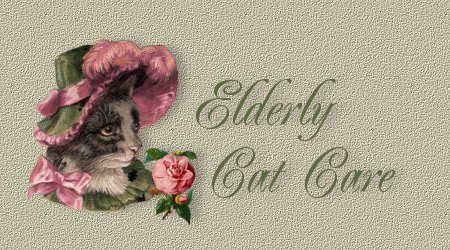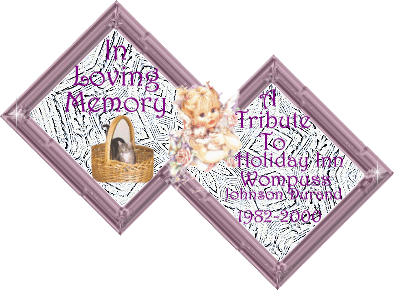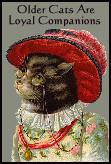

This page is dedicated to Holiday Inn Wompuss Johnson
Durand. He went to wait for me at Rainbow Bridge on January 12, 2000. He left purring in
my arms. He was 18 years old. He was well-loved and will be sorely missed. He left this
life just like he lived it...with quiet dignity. Thank you, Holly, for each precious
memory, each comforting purr and touch of your paw, each nose kiss, each belly rub. Thank
you for all those lazy afternoons in your favorite sunshine spot, sometimes snuggled up
tightly against my stomach if I were so lucky to take a "cat nap" with you. I
see you in every corner, every soft spot, every window. I feel your little warm body next
to mine when I'm sleeping and will carry your spirit in my heart forever. I wouldn't have
missed loving you for the world, my precious angel doll. Please read Holly's Story here.

Memorial graphic made for Holly by my
best friend, Juicey
Thank you so much.


~ On a Cat Aging ~
Alexander Gray (1882-1968)
He blinks upon the hearth-rug
And yawns in deep content
Accepting all the comforts
That Providence has sent.
Louder he purrs, and louder,
In one glad hymn of praise,
For all the night's adventures,
For quiet, restful days.
Life will go on forever,
With all that cat can wish;
Warmth, and the glad procession
Of fish, and milk and fish.
Only ~ the thought disturbs him ~
He's noticed once or twice,
The times are somehow breeding
A nimbler race of mice.

~ Geriatric Cat Complaints ~
from Living With Cats
by Gale B. Nemec
The older cat, over eight or nine
years of age, has special medical concerns. The owner must monitor his water and food
intake closely to be sure he gets enough. An increase in thirst can signal the onset of
diabetes, kidney problems, or thyroid disease. A lack of appetite may indicate the
presence of a fever. Changes in urination can also be signs of illness. For example, if
your cat seems to be making exceptionally frequent trips to the litter box, he may have a
urinary tract infection. Or difficulty with bowel movements can mean that he has swallowed
something, such as a fur ball ~ a common occurrence in older cats.
Also, watch his eyes to see if there
is any change in their color or clarity: Older cats often develop cataracts, a condition
that is signaled by cloudiness of the lenses. Also, watch the older cat's gums for redness
or other discoloration. Gum disease is common among geriatric cats.
The older cat's coat may be another
signal of a medical concern. A loss of luster can indicate a change in health. Also, older
cats may have trouble cleaning themselves, so the owner has to take up the slack. Nails
have to be trimmed regularly because older cats are prone to infection around the nail
beds.
Trips to the vet every six to twelve
months are recommended for the older cat because of the likelihood of deterioration in
health with age. You'll find that your vet has access to many sophisticated diagnostic
tools, such as ultrasound and electrocardiograms, to keep your older cat in the best
possible health.

~ Be a True Blue Friend ~
From How to Get Your Cat to
Do What You Want by Warren Eckstein and Fay Eckstein
Make sure you're very good to senior
Kitty. He may be a little crotchety. Maybe he's a bit stiff and feeble. But Kitty's been
good to you for a long, long time. He's made you smile and comforted you when you cried.
Don't get sloppy about our special friend's care when he needs you most. You'll never
forgive yourself if you do. Your loving little pal deserves the best, particulary while
the sun is setting on his time on earth.


Remember our stories when fur and
bones and tail of me are gone. Share them with some young new mouser, who'll need to learn
where blue jays live, where rabbits hide..........who'll share your couch and bowls of
milk, who'll be your friend.......although maybe not as good a friend as I. from Old
Cat by Barbara Libby


  
Older Cats Card from:


Sign my Guestbook
Read my Guestbook

|